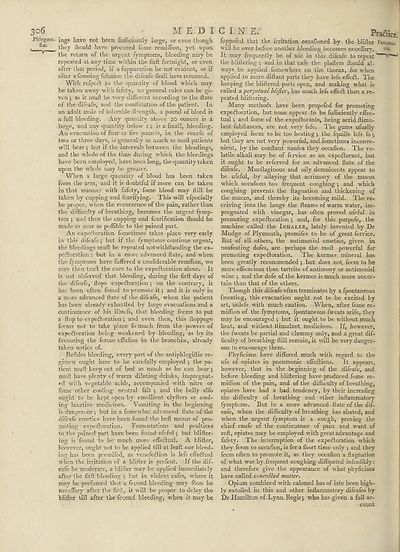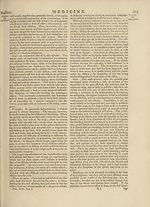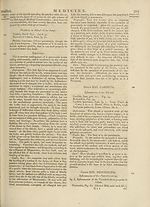Encyclopaedia Britannica, or, a Dictionary of arts, sciences, and miscellaneous literature : enlarged and improved. Illustrated with nearly six hundred engravings > Volume 13, MAT-MIC
(348) Page 306
Download files
Complete book:
Individual page:
Thumbnail gallery: Grid view | List view

306
Phlegma- ings have not been fufficiently large, or even though
, they ihould have procured feme remiiTion, yet upon
the return of the urgent fymptoms, bleeding may be
repeated at any time within the firft fortniglit, or even
after iliat period, if a fuppuration be not evident, or if
after a feeming folution the difeafe ihall have returned.
With refpeet to the quantity of blood which may
be taken away with fafety, no general rules can be gi¬
ven •, as it inuft be very different according to the Hate
of the difeafe, and the conlfitution of the patient. In
an adult male of tolerable ftrength, a pound of blood is
a full bleeding. Any quantity above 20 ounces is a
large, and any quantity below 12 is a frnall, bleeding.
An evacuation of four or five pounds, in the eourfe of
two or three days, is generally as much as moil patients
will bear ; but if the intervals between the bleedings,
and the whole of the time dming which the bleedings
have been employed, have been long, the quantity taken
upon the whole may be greater.
When a large quantity of blood has been taken
from the arm, and it is doubtful if more can be taken
in that manner with fafety, fome blood may Hill be
taken by cupping and fcarifying. This will efpecially
be proper, when the recurrence of the pain, rather than
the difficulty of breathing, becomes the urgent fymp-
tom and then the cupping and fcarification ffiould be
made as near as poffible to the pained part.
An expe&oration fometimes takes place very early
in this difeafe; but if the fymptoms continue urgent,
the bleedings mufl be repeated notwithftanding the ex-
pe&oration : but in a more advanced Hate, and when
the fymptoms have fuffered a confiderable remffion, we
may then truft the cure to the expectoration alone. It
is not obferved that bleeding, during the firit days of
the difeafe, Hops expeftoration 5 on the contrary, it
has been often found to promote it •, and it is only in
a more advanced Hate of the difeafe, when the patient
has been already exhaulted by large evacuations and a
continuance of his illnefs, that bleeding feems to put
a flop to expeftoration ; and even then, this Itoppage
feems not to take place fo much from the powers of
expectoration being weakened by bleeding, as by its
favouring the ferous effufion in the bronchia;, already
taken notice of.
Befides bleeding, every part of the antiphlogiftic re¬
gimen ought here to be carefully employed j the pa¬
tient muft keep out of bed as much as he can bear j
muft. have plenty of warm diluting drinks, impregnat¬
ed with vegetable acids, accompanied with nitre or
fome other cooling neutral fait •, and the belly alfo
ought to be kept open by emollient clyfters or cool¬
ing laxative medicines. Vomiting in the beginning
is dangerous •, but in a fomewhat advanced Hate of the
difeafe emetics have been found the belt means of pro¬
moting expeCIoration. Fomentations and poultices
to the pruned part have been found ufeful; but blifter-
ing is found to be much more effectual. A blifter,
however, ought not to be applied till at lead one bleed¬
ing has been premifed, as venefeCHon is lefs effectual
when the irritation of a blifter is prefent. If the dif¬
eafe be moderate, a blifter may be applied immediately
after the firft bleeding •, but in violent cafes, where it
may be prefumed that a fecond bleeding may fton be
neceffary after the firft, it will be proper to delay the
blifter till after the fecond bleeding, when it may be
Pra£Uce;
fuppofed that the irritation occaHoned by the blifter Pneumo.
will be over before another bleeding becomes neceffary. 11 ia.
It may frequently be of ufe in this difeafe to repeat J
the bliftering •, and in that cafe the plafters ffiould al¬
ways be applied fomewhere on the thorax, for when
applied to more diftant parts they have lefs effect. The
keeping the bliftered parts open, and making what is
called a perpetual blijler, has much lefs effeCt than a re¬
peated bliftering.
Many methods have been propofed for promoting
expeCIoration, but none appear to be fufficiently effec¬
tual •, and fome of the expeCtorants, being acrid ftimu-
lant fubftances, are not very fafe. The gums ufually
employed feem to be too heating j the fquills lei's fo j
but they are not very powerful, and fometimes inconve¬
nient, by the conftant naufea they occafion. The vo¬
latile alkali may be of fervice as an expeCtorant, but
it ought to be referved for an advanced ftate of the
difeafe. Mucilaginous and oily demulcents appear to
be ufeful, by allaying that acrimony of the mucus
which occafions too frequent coughing •, and which
coughing prevents the ftagnation and thickening of
the mucus, and thereby its becoming mild. The re¬
ceiving into the lungs the fleams of warm water, im¬
pregnated with vinegar, has often proved ufeful in
promoting expeCIoration ; and, for this purpofe, the
machine called the Inhaler, lately invented by Dr
Mudge of Plymouth, promifes to be of great ferviee.
But of all others, the antimonial emetics, given in
naufeating dofes, are perhaps the moft powerful for
promoting expeCIoration. The kermes mineral has
been greatly recommended j but does not,, feem to be
more efficacious than tartrite of antimony or antimonial
wine ; and the dofe of the kermes is much more uncer¬
tain than that of the others.
Though this difeafe often terminates by a fpontaneous
fweating, this evacuation ought not to be excited by
art, unlefs with much caution. When, after fome re-
miffion of the fymptoms, fpontaneous fweats arife, they
may be encouraged •, but it ought to be without much,
heat, and without ftimulant medicines. If, however,
the fweats be partial and clammy only, and a great dif¬
ficulty of breathing ftill remain, it will be very danger¬
ous. to encourage them.
Phyficians have differed much with regard to the
ufe of opiates in pneumonic affeCtions. It appears,
however, that in the beginning of the difeafe, and
before bleeding and bliftering have produced fome re-
miffion of the pain, and of the difficulty of breathing,
opiates have had a bad tendency, by their increafing
the difficulty of breathing and other inflammatory
fymptems. But in a more advanced ftate of the dif¬
eafe, when the difficulty of breathing has abated, and
when the urgent fymptom is a cough, proving the
chief caufe of the continuance of pain and want of
reft, opiates may be employed with great advantage and
fafety. The interruption of the expeftoration which
they feem to occafion, is for a fhort time only 5 and they
feem often to promote it, as they occafion a ftaghation
of what was by frequent coughing diffipated infenfibly:
and therefore give the appearance of what phyficians
have called conco&ed matter.
Opium combined with calomel has of late been high¬
ly extolled in this and other inflammatory difeafes by
Dr Hamilton of Lynn Regis; who has given a full ac¬
count
MEDICI N E.
Phlegma- ings have not been fufficiently large, or even though
, they ihould have procured feme remiiTion, yet upon
the return of the urgent fymptoms, bleeding may be
repeated at any time within the firft fortniglit, or even
after iliat period, if a fuppuration be not evident, or if
after a feeming folution the difeafe ihall have returned.
With refpeet to the quantity of blood which may
be taken away with fafety, no general rules can be gi¬
ven •, as it inuft be very different according to the Hate
of the difeafe, and the conlfitution of the patient. In
an adult male of tolerable ftrength, a pound of blood is
a full bleeding. Any quantity above 20 ounces is a
large, and any quantity below 12 is a frnall, bleeding.
An evacuation of four or five pounds, in the eourfe of
two or three days, is generally as much as moil patients
will bear ; but if the intervals between the bleedings,
and the whole of the time dming which the bleedings
have been employed, have been long, the quantity taken
upon the whole may be greater.
When a large quantity of blood has been taken
from the arm, and it is doubtful if more can be taken
in that manner with fafety, fome blood may Hill be
taken by cupping and fcarifying. This will efpecially
be proper, when the recurrence of the pain, rather than
the difficulty of breathing, becomes the urgent fymp-
tom and then the cupping and fcarification ffiould be
made as near as poffible to the pained part.
An expe&oration fometimes takes place very early
in this difeafe; but if the fymptoms continue urgent,
the bleedings mufl be repeated notwithftanding the ex-
pe&oration : but in a more advanced Hate, and when
the fymptoms have fuffered a confiderable remffion, we
may then truft the cure to the expectoration alone. It
is not obferved that bleeding, during the firit days of
the difeafe, Hops expeftoration 5 on the contrary, it
has been often found to promote it •, and it is only in
a more advanced Hate of the difeafe, when the patient
has been already exhaulted by large evacuations and a
continuance of his illnefs, that bleeding feems to put
a flop to expeftoration ; and even then, this Itoppage
feems not to take place fo much from the powers of
expectoration being weakened by bleeding, as by its
favouring the ferous effufion in the bronchia;, already
taken notice of.
Befides bleeding, every part of the antiphlogiftic re¬
gimen ought here to be carefully employed j the pa¬
tient muft keep out of bed as much as he can bear j
muft. have plenty of warm diluting drinks, impregnat¬
ed with vegetable acids, accompanied with nitre or
fome other cooling neutral fait •, and the belly alfo
ought to be kept open by emollient clyfters or cool¬
ing laxative medicines. Vomiting in the beginning
is dangerous •, but in a fomewhat advanced Hate of the
difeafe emetics have been found the belt means of pro¬
moting expeCIoration. Fomentations and poultices
to the pruned part have been found ufeful; but blifter-
ing is found to be much more effectual. A blifter,
however, ought not to be applied till at lead one bleed¬
ing has been premifed, as venefeCHon is lefs effectual
when the irritation of a blifter is prefent. If the dif¬
eafe be moderate, a blifter may be applied immediately
after the firft bleeding •, but in violent cafes, where it
may be prefumed that a fecond bleeding may fton be
neceffary after the firft, it will be proper to delay the
blifter till after the fecond bleeding, when it may be
Pra£Uce;
fuppofed that the irritation occaHoned by the blifter Pneumo.
will be over before another bleeding becomes neceffary. 11 ia.
It may frequently be of ufe in this difeafe to repeat J
the bliftering •, and in that cafe the plafters ffiould al¬
ways be applied fomewhere on the thorax, for when
applied to more diftant parts they have lefs effect. The
keeping the bliftered parts open, and making what is
called a perpetual blijler, has much lefs effeCt than a re¬
peated bliftering.
Many methods have been propofed for promoting
expeCIoration, but none appear to be fufficiently effec¬
tual •, and fome of the expeCtorants, being acrid ftimu-
lant fubftances, are not very fafe. The gums ufually
employed feem to be too heating j the fquills lei's fo j
but they are not very powerful, and fometimes inconve¬
nient, by the conftant naufea they occafion. The vo¬
latile alkali may be of fervice as an expeCtorant, but
it ought to be referved for an advanced ftate of the
difeafe. Mucilaginous and oily demulcents appear to
be ufeful, by allaying that acrimony of the mucus
which occafions too frequent coughing •, and which
coughing prevents the ftagnation and thickening of
the mucus, and thereby its becoming mild. The re¬
ceiving into the lungs the fleams of warm water, im¬
pregnated with vinegar, has often proved ufeful in
promoting expeCIoration ; and, for this purpofe, the
machine called the Inhaler, lately invented by Dr
Mudge of Plymouth, promifes to be of great ferviee.
But of all others, the antimonial emetics, given in
naufeating dofes, are perhaps the moft powerful for
promoting expeCIoration. The kermes mineral has
been greatly recommended j but does not,, feem to be
more efficacious than tartrite of antimony or antimonial
wine ; and the dofe of the kermes is much more uncer¬
tain than that of the others.
Though this difeafe often terminates by a fpontaneous
fweating, this evacuation ought not to be excited by
art, unlefs with much caution. When, after fome re-
miffion of the fymptoms, fpontaneous fweats arife, they
may be encouraged •, but it ought to be without much,
heat, and without ftimulant medicines. If, however,
the fweats be partial and clammy only, and a great dif¬
ficulty of breathing ftill remain, it will be very danger¬
ous. to encourage them.
Phyficians have differed much with regard to the
ufe of opiates in pneumonic affeCtions. It appears,
however, that in the beginning of the difeafe, and
before bleeding and bliftering have produced fome re-
miffion of the pain, and of the difficulty of breathing,
opiates have had a bad tendency, by their increafing
the difficulty of breathing and other inflammatory
fymptems. But in a more advanced ftate of the dif¬
eafe, when the difficulty of breathing has abated, and
when the urgent fymptom is a cough, proving the
chief caufe of the continuance of pain and want of
reft, opiates may be employed with great advantage and
fafety. The interruption of the expeftoration which
they feem to occafion, is for a fhort time only 5 and they
feem often to promote it, as they occafion a ftaghation
of what was by frequent coughing diffipated infenfibly:
and therefore give the appearance of what phyficians
have called conco&ed matter.
Opium combined with calomel has of late been high¬
ly extolled in this and other inflammatory difeafes by
Dr Hamilton of Lynn Regis; who has given a full ac¬
count
MEDICI N E.
Set display mode to:
![]() Universal Viewer |
Universal Viewer | ![]() Mirador |
Large image | Transcription
Mirador |
Large image | Transcription
Images and transcriptions on this page, including medium image downloads, may be used under the Creative Commons Attribution 4.0 International Licence unless otherwise stated. ![]()
| Permanent URL | https://digital.nls.uk/192665686 |
|---|
| Attribution and copyright: |
|
|---|
| Description | Ten editions of 'Encyclopaedia Britannica', issued from 1768-1903, in 231 volumes. Originally issued in 100 weekly parts (3 volumes) between 1768 and 1771 by publishers: Colin Macfarquhar and Andrew Bell (Edinburgh); editor: William Smellie: engraver: Andrew Bell. Expanded editions in the 19th century featured more volumes and contributions from leading experts in their fields. Managed and published in Edinburgh up to the 9th edition (25 volumes, from 1875-1889); the 10th edition (1902-1903) re-issued the 9th edition, with 11 supplementary volumes. |
|---|---|
| Additional NLS resources: |
|

